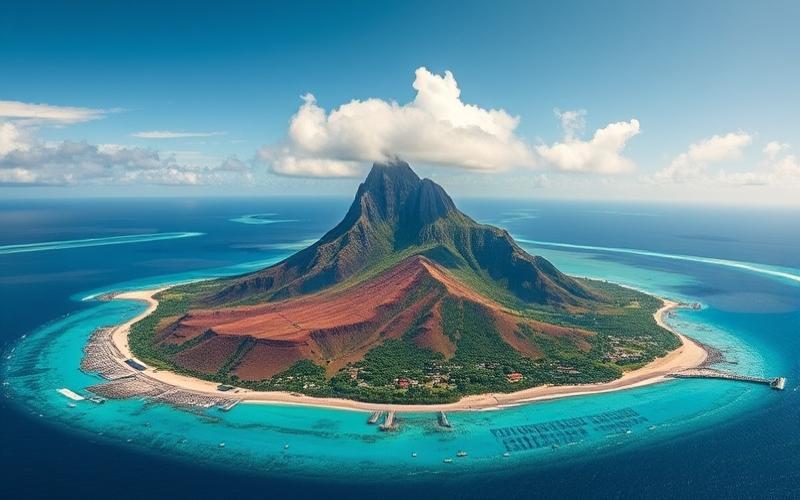
 Published on and written by Cyril Jarnias
Published on and written by Cyril Jarnias
Mauritius, known for its paradise beaches and vibrant culture, continues to evolve under the influence of the real estate market. Among recent innovations disrupting this sector, the “dark stores” phenomenon is emerging as an undeniable trend.
These urban storage spaces, dedicated exclusively to preparing online orders, are transforming how Mauritians perceive real estate and retail. As these discreet warehouses multiply, they raise exciting questions about the future of island urban planning and goods distribution.
Discover how this silent revolution is redefining not only consumption patterns but also the economic landscape of Mauritius, a territory where tradition and modernity coexist in harmony.
The Development of Urban Warehouses for Fast Delivery in Mauritius
“Dark stores” refer to urban warehouses dedicated exclusively to preparing orders for fast delivery, with no customer service on-site. This logistics model emerged from the rise of e-commerce and has recently been established in Mauritius, driven by growing demand for express delivery in urban areas.
The emergence of dark stores in Mauritius is part of a profound transformation of the logistics and real estate sector. These warehouses bring inventory closer to end consumers, thereby enabling:
- Drastic reduction in delivery times (often same-day)
- Better operational flexibility for local and international businesses
- Optimization of the last mile through strategically placed urban hubs
Main Impacts on Distribution and Customer Satisfaction:
- Accelerated access to everyday products (groceries, electronics, fashion)
- Real-time tracking and customizable time slots
- Notable improvement in customer experience with less waiting
Summary Table – Growing Role of Dark Stores in the Mauritian Ecosystem:
| Aspect | Main Impact |
|---|---|
| Logistics | Optimization of urban storage |
| Real Estate | New uses for vacant commercial spaces |
| Distribution | Express delivery (2h–24h) |
| Consumers | Increased satisfaction, broader choice |
Challenges Related to Their Urban Implementation:
- Regulations sometimes unsuitable for the new type of activity
- Potential increase in real estate costs in certain sought-after areas
- Need to invest in automation (robotics, advanced computer systems)
Opportunities Offered:
- Rehabilitation of underutilized or vacant buildings in city centers
- Creation of specialized jobs in urban logistics and digital technologies
- Incentive for sustainable development via clean vehicles or electric tricycles
Concrete Examples:
Bongéni already offers a fast same-day “pick-up & delivery” service from its own local hubs adapted to the Mauritian market. Other players are setting up micro-hubs inspired by the European model to efficiently serve the entire island while limiting their carbon footprint.
Involved Stakeholders Include:
- Innovative local companies specialized in smart urban logistics.
- International operators adapting their proven solutions to island specificities.
- E-commerce platforms strengthening their partnerships with these new urban centers.
Habits are changing rapidly: Mauritian consumers now expect speed, precise tracking, and flexibility—which directly stimulates the continuous development of dark stores across the entire territory.
The massive arrival of these specialized warehouses is transforming not only consumption patterns but also the local economic fabric, promoting a new real estate dynamic centered on customer proximity and operational responsiveness.
Good to Know:
“Dark stores” are emerging in Mauritius as an innovative solution to meet growing demand for fast deliveries, with these urban warehouses playing a key role in the logistics and real estate sector. They optimize product distribution, thereby increasing consumer satisfaction, although their implementation in urban areas presents challenges in terms of regulation and real estate costs. The integration of automation technologies offers opportunities to improve logistics efficiency; however, it requires major investments. These warehouses are transforming the urban landscape and stimulating the local economy by adapting consumption habits toward greater demand for speed. Examples like the entry of international chains into Mauritius illustrate how these new players, in collaboration with local companies, are shaping the future of retail.
Dark Stores: An Innovative Logistics Solution for Real Estate in Mauritius
Dark stores represent a major logistics innovation in Mauritius’ real estate landscape. These spaces, closed to the public, are exclusively dedicated to preparing and delivering e-commerce orders. They thus transform traditional commercial premises into micro-distribution centers or urban logistics hubs.
Role of Dark Stores in the Supply Chain:
- Optimized storage to quickly respond to online orders.
- Centralized product picking and packaging to improve operational efficiency.
- Accelerated delivery thanks to their strategic location near or within urban centers, reducing last-mile delays.
| Function | Traditional | Dark Store |
|---|---|---|
| Sales | On-site | Online only |
| Customer Access | Public | Closed to public |
| Logistics | Decentralized | Locally centralized |
Response to Growing E-commerce Needs:
- Dark stores allow absorption of the rapid increase in demand related to online commerce, particularly for food and essential products.
- They guarantee increased stock availability and flexibility in the face of seasonal or promotional peaks.
Impact on the Local Real Estate Market:
- Increased demand for premises suited to urban logistics rather than customer service.
- Reassignment of vacant commercial spaces to these new uses, which promotes their valuation and limits commercial vacancies in certain areas.
- Evolution of leasing practices with a potential increase in short or flexible contracts adapted to the fluctuating needs of e-commerce.
Challenges and Opportunities for Mauritian Investors/Entrepreneurs:
Opportunities
- Rapid value creation through transformation/rehabilitation of underutilized real estate assets
- Generation of stable income through leases signed with logistics operators or digital retailers
- Enhanced attractiveness to international players seeking a regional hub
Challenges
- Necessary regulatory adaptation (urban zoning, accessibility)
- Significant initial investments for compliance (safety, connectivity)
- Fine management of logistics flows to avoid nuisances (increased traffic around hubs)
Future Perspectives in Mauritian Urban Planning:
The increasing integration of the dark store model should encourage more flexible urban planning where certain neighborhoods hybridize residential/logistics/commercial activities. This model also promotes sustainable development through land optimization: fewer vacant spaces and better existing use. In the long term, we can anticipate:
- Multiplication of urban micro-hubs integrating light automation
- Partnership development between local authorities and private players around smart city solutions focused on urban supply chain
- Comprehensive reflection on soft mobility associated with the last mile
Thus, dark stores are reshaping not only real estate practices but also the entire spatial organization related to modern distribution on the island.
Good to Know:
Dark stores, these warehouses optimized for e-commerce, are revolutionizing the real estate landscape in Mauritius by responding to growing demand for speed and efficiency in the supply chain. Facilitating express deliveries, they stimulate new demand for strategically located commercial premises, thereby transforming the local real estate market. These spaces support the e-commerce boom and modify leasing practices by shifting from simple storefronts to efficient logistics hubs, adapting rents to more flexible and often shorter periods. For investors and entrepreneurs, these dark stores offer expansion opportunities while posing challenges in terms of regulation and infrastructure. In the future, their integration into Mauritian urban planning could influence city development, encouraging development policies mindful of reducing carbon footprint while optimizing logistics efficiency on the island.
The Impact of E-commerce on Real Estate Investment in Mauritius
E-commerce is experiencing rapid growth in Mauritius, supported by favorable government policies and the integration of advanced technologies such as artificial intelligence and blockchain. By 2025, the commercial real estate market is being transformed by this dynamic, with a notable impact on demand for certain types of properties.
Current E-commerce Trends in Mauritius
- Continuous growth in online transaction volume.
- Development of high-performance digital and logistics infrastructures.
- Implementation of an incentive tax regime: companies creating an e-commerce platform before June 30, 2025 benefit from a five-year tax exemption.
Key Statistics
| Indicator | Value/Recent Evolution |
|---|---|
| Annual e-commerce growth rate | Strong increase expected until 2025 |
| Minimum required investment | MUR 5 million to obtain a certificate |
| Annual operational expenses | At least MUR 10 million |
| Jobs created per e-commerce company | Minimum ten residents |
Effect on Real Estate Demand
The progression of online commerce is profoundly changing the nature of sought-after spaces:
- Relative decrease in demand for traditional downtown shops.
- Marked increase for:
- Modern logistics spaces (warehouses, distribution centers)
- Hybrid platforms (digital showrooms, pickup points)
- Connected offices adapted to digital activities
“Dark Stores” in Mauritius
“Dark stores”—urban warehouses dedicated exclusively to rapid processing of e-commerce orders without physical customer service—now play a key role:
- Optimization of delivery times and costs across the island
- Strategic location near densely populated areas or major road axes
- Contribution to a new real estate typology where flexibility and efficiency prevail
Potential effects on the local real estate market:
| Aspect | Observed/Anticipated Effect |
|---|---|
| Demand for logistics spaces | Strongly increased in peripheral hubs |
| Real estate requalification | Conversion of former stores into mini-hubs |
| Land valuation | Increase around strategic infrastructures |
Regulation & Incentive Environment
The regulatory framework is evolving rapidly:
The government announced in May 2025 the upcoming development of specific regulations to more strictly govern electronic commercial practices (Fair Trading E-Commerce Regulations).
Opportunities offered:
- Targeted tax exemptions
- Administrative simplification via the one-stop shop Economic Development Board
- Facilitated access for foreign investors under conditions (local technological domiciliation)
Redefinition of the Traditional Real Estate Concept
Facing these changes:
- Boundaries between physical and virtual commerce are blurring: rise of click-and-mortar.
- Real estate becomes multi-service: automated storage, flexible offices integrating IoT solutions.
- Investors primarily target assets adaptable to mixed uses or transformable according to future needs.
Concrete examples recently observed:
- Progressive transformation of classic warehouses located near the free port into omnichannel hubs serving the entire Indian Ocean region.
- Increasing installation of urban “dark store” centers operating for multiple local platforms simultaneously.
The meteoric rise of electronic commerce is thus durably reshaping the Mauritian real estate landscape—both in its opportunities and in its very structure—offering fertile ground for innovative strategies combining technology, operational agility, and regulatory anticipation.
Good to Know:
With the rapid growth of e-commerce in Mauritius, estimated at about 15% annual increase, the local real estate market is undergoing notable transformations, prompting increased demand for “dark stores”—these dedicated spaces serving as storage centers to facilitate fast deliveries. The rise of these facilities is redefining traditional real estate concepts, increasing investor interest in industrial and logistics properties, to the detriment of classic commercial spaces. Regulatory aspects are crucial, requiring specific licenses and compliance with construction standards, which could also create new opportunities for local and foreign developers aiming to adapt real estate supply to current electronic needs. For example, the new logistics center at La Tour Koenig, which created an efficient network for e-commerce players, demonstrates how integrating adapted infrastructures can stimulate the sector. Thus, the dark store phenomenon illustrates a transition toward a hybrid real estate model, combining e-commerce and urban planning, while adapting to local economic realities.
Adaptation Strategies for the Real Estate Sector Facing the Rise of Dark Stores
The rise of dark stores in Mauritius, stimulated by the growth of online commerce and demand for fast deliveries, is pushing the local real estate sector to rethink its strategies and offerings.
Adaptation Strategies for the Real Estate Sector
- Conversion of underperforming commercial spaces (empty shops, former stores) into urban logistics centers or dark stores.
- Development of new mixed spaces combining classic distribution and order preparation to meet omnichannel clientele.
- Strategic positioning of premises: preferential location in or near urban centers to optimize delivery times.
- Investment in adapted infrastructures (24/7 delivery access, optimized storage, digital solutions).
- Proactive negotiation with e-commerce players to anticipate their specific needs.
Possible Impacts on Commercial Rents and Lease Types
| Factor | Potential Impact |
|---|---|
| Increased demand in urban areas | Possible rent increases in certain central neighborhoods |
| Traditional spaces poorly adapted | Downward pressure on rents outside strategic areas |
| Lease types | Emergence of more flexible contracts (short durations, specific clauses related to logistics activities) |
Evolution of Demand for Different Commercial Spaces
- Progressive decrease in need for classic large retail spaces in favor of:
- Compact urban warehouses
- Logistics micro-hubs
- Multipurpose spaces that can evolve according to demand
- Transformation of shopping streets toward mixed use integrating traditional commerce and urban logistics
Possible Sector Responses
- Rapid adaptation through renovation or real estate reassignment
- Development of flexible rental offers responding to e-commerce short cycles
- Increased integration between landowners/investors and logistics operators
Implications for Urban Planning & Local Regulations
List of issues:
- Increased management of delivery-related traffic (“last mile”)
- Reinforced need for adapted infrastructures (dedicated unloading zones, utility vehicle access)
- Potential revision of local urban plans/regulations: specific consideration of hybrid activities (commerce/logistics), possible limitations on location or density of dark stores
Potential Opportunities for Real Estate Investors
Investors can benefit from:
- Increased valuations on certain well-located assets convertible into logistics hubs
- Diversification toward a new leasing typology less dependent on traditional foot traffic
- Innovative partnerships with technology/e-commerce players to pool investments
Importance of Innovation in Business Models
To remain competitive in the face of this phenomenon:
- Need to integrate advanced digitalization in lease/logistics management
- Rapid adoption of hybrid concepts blending physical/digital experience
- Continuous exploration of new contractual forms to attract both startups and specialized large groups
The rapid development of dark stores thus imposes a profound transformation of the Mauritian commercial real estate landscape. Strategic agility and innovation will be key to seizing these opportunities while sustainably supporting this urban mutation.
Good to Know:
Facing the rise of dark stores in Mauritius, the real estate sector must adjust its strategies by revising commercial leases to make them more flexible, in order to attract tenants favoring these urban mini-warehouses. This situation could affect rental prices of commercial spaces, often less in demand, as well as the growing demand for premises located near urban centers, thus accentuating the need to adapt urban planning. Local regulation could evolve to frame this phenomenon, offering opportunities for investors who turn toward property diversification, integrating innovative initiatives, such as co-working spaces or shared multi-use spaces, to maximize the use of urban surfaces. Sector players must thus rethink their business models to remain competitive by betting on innovation and adapting their offers to new consumption and logistics dynamics.
Disclaimer: The information provided on this website is for informational purposes only and does not constitute financial, legal, or professional advice. We encourage you to consult qualified experts before making any investment, real estate, or expatriation decisions. Although we strive to maintain up-to-date and accurate information, we do not guarantee the completeness, accuracy, or timeliness of the proposed content. As investment and expatriation involve risks, we disclaim any liability for potential losses or damages arising from the use of this site. Your use of this site confirms your acceptance of these terms and your understanding of the associated risks.




























